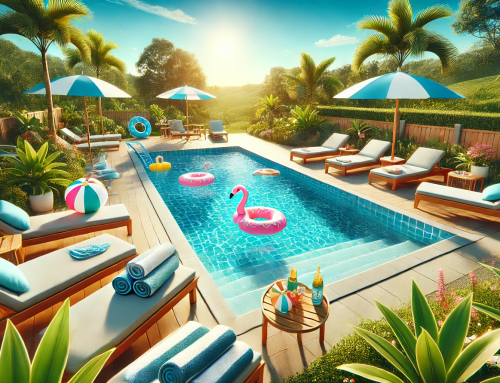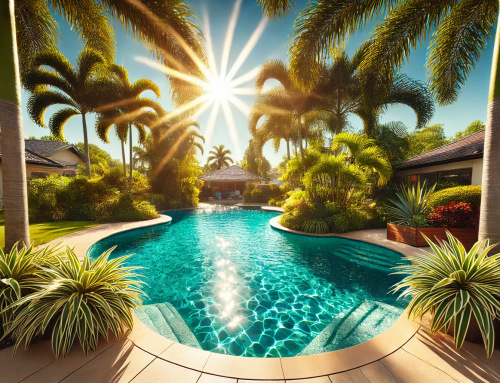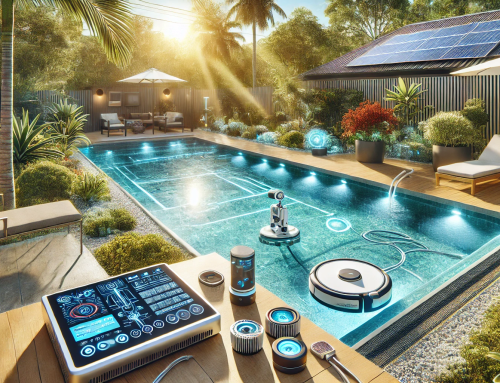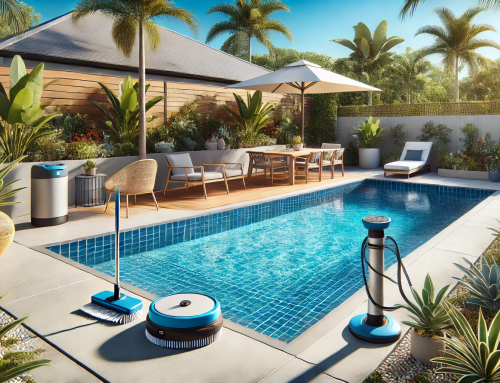A good summer storm might be great for the garden, but it can wreak havoc on your pool water chemistry. Here in North Lakes and surrounding suburbs—from Kallangur and Rothwell to Deception Bay and Murrumba Downs—it’s not uncommon for storms to dump several centimetres of rain in just a few hours. While the rainfall itself might seem harmless, what it drags into your pool is what causes trouble.
“After heavy rain, we often see customers coming in as rainwater wash-off has caused the swimming pool to become cloudy water, algae outbreaks, or filters that just can’t keep up,” says Kylie Rojahn, owner of Atlantis Pools. “Rain doesn’t just fill your pool—it changes its chemistry and introduces a whole range of contaminants.”
Here’s how rain affects your pool and what you can do to keep it clean, clear, and balanced.
Contaminants from Run-Off
When your pool area gets drenched by rain—especially during flash storms—run-off from nearby lawns, garden beds, or even concrete surfaces can end up flowing into the pool. Just a small amount of dirt, mulch, or leaves can introduce phosphates, which become food for algae.
In more severe cases, pools can be overwhelmed with muddy water, debris, and silt.
“If your pool’s surrounded by garden beds or slopes, it’s important to plan ahead. We recommend having a leaf rake on hand and a slow vacuum ready to go,” Kylie advises.
What to Do If Your Pool Floods:
-
Remove large debris with a leaf rake
-
Slow vacuum to waste to avoid overloading your filter
-
Brush the pool daily to prevent staining and algae
-
Run the filter continuously for 24–48 hourseven up to 72 Hours. In some cases, depending on your pool equipment up to a week.
-
Use clarifiers or flocculants to help and assist the filter capture fine particles and is often the fastest way to remove unwanted contaminants and particles from the swimming pool water.
-
Backwash the filter as needed
Once the water clears, it’s time to address any lingering phosphates—these feed algae and must be removed to low chlorine levels, resulting in a green pool later. Remember phosphates are the food source of alge and chlorine is the food source of phosphates.
“Using a phosphate remover is easy,” Kylie says. “Just pour it into balanced water, run your filter for a day, then backwash. It makes a big difference.”
Contaminants from the Rain Itself
Rainwater might start out pure, but by the time it lands in your pool, it’s anything but. As it falls, it collects dust, pollen, pollution, oils, and sometimes even algae spores—especially if there are tall trees overhanging your pool.
“Think of rain like a rinse cycle for your roof and trees,” Kylie explains. “Everything sitting on those surfaces ends up washed straight into the pool, especially when homeowners use water diverts and water tanks to increase water level in swimming pools.
NOTE: do not use water tanks to fill a spa or swim spa.”
Even without visible debris, rain can affect your water chemistry. It dilutes essential components like cyanuric acid, which protects chlorine from the sun, and it can soften the water, lowering calcium hardness, pH, and alkalinity.
In cases of acid rain—which is more common during humid, smoggy days—the pH of your pool water can drop quickly, causing irritation for swimmers and potential damage to pool surfaces.
How to Prepare for Rain and What to Do After
The best way to protect your pool is to get ahead of the weather. Here’s what we recommend to prepare for change of season:
Before the Rain:
-
Add a long-lasting algaecide to reduce the chance of algae blooms
-
Clear debris from the pool area to limit run-off contamination
-
Check water balance, especially pH and chlorine
-
Add a clarifier
After the Rain:
-
Skim debris immediately
-
Test water balance, focusing on chlorine, pH, and phosphates
-
Add phosphate remover if needed
-
Backwash or clean your filter
-
Run your filtration system for at least 24 hours
“If your pool looks off or you’re unsure about the chemistry, bring in a sample and we’ll test it for free,” Kylie adds. “Our in-store testing service gives you an accurate reading and a clear plan to get your water back on track.”
Rain Doesn’t Have to Ruin Your Pool
In Queensland, storms are just part of life—but they don’t have to mean murky, unbalanced pool water. With the right prep and quick follow-up, your pool can stay clear and healthy all season long.
At Atlantis Pools, we’re here to help with phosphate removers, algaecides, water testing, and expert advice you can trust.
Worried about your pool after the rain? Bring us a water sample—within 20 minutes of collection in an approved container—and we’ll help you get things sorted fast.
📞 (07) 3491 9700
📧 atlantispoolshop@bigpond.com
🌐 www.atlantispoolshop.com.au




